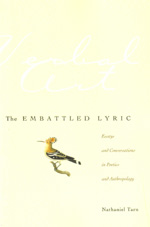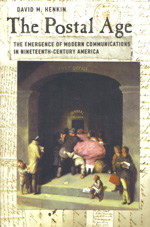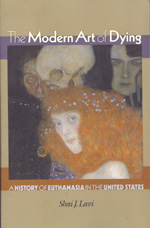| |
 |
|
The
EMBATTLED LYRIC
Essays and Conversations in Poetics and Anthropology
Nathaniel
Tarn
Stanford University Press
0-8047-5054-8
$21.95
|
This book has two main subjects
which are interwoven: (1) the attitudes of selected poets (Neruda,
Rilke, Breton, Celan, Artaud, Huidobro, Leiris, Paz, etc.) to the
"primitive" and the "archaic," looked at from
an anthropologist's viewpoint; (2) a model of the processes whereby
poetry is produced and received built on Tarn's being in the very
rare situation of having full careers as both poet and anthropologist.
The book includes detailed biographical information about how Tarn
went from being a French to an English to an American poet. It also
reveals the effect of a double career and of these moves on a unique
body of poetry and theoretical work. An extremely substantial interview,
serving also as an introduction to, and discussion of, the essays,
demonstrates that there is nothing like this work in our literature.
 |
|
The
Postal Age
The Emergence of Modern Communications in
Nineteenth-Century America
David
M. Henkin
The University of Chicago Press
0-226-32721-3
$ 20
|
Many
of us may not realize that what we now call snail mail was once
just as revolutionary as e-mail and text messages are today. As
David M. Henkin argues in The Postal Age, a burgeoning postal network
initiated major cultural shifts during the nineteenth century, laying
the foundation for the interconnectedness that now defines our ever-evolving
world of telecommunications.
This fascinating history traces these shifts from their beginnings
in the mid-1800s, when cheaper postage, mass literacy, and migration
combined to make the long established postal service a more integral
and viable part of everyday life. Drawing on original correspondence
and public discussions from the period, Henkin tells the story of
how Americans adjusted to a new world of long-distance correspondence,
crowded post offices, junk mail, valentines, and dead letters. Throughout,
The Postal Age paints a vibrant picture of a society where possibilities
proliferated for personal and impersonal communications.
 |
|
The
Modern Art of Dying
A History of Euthanasia in the United States
Shai
J. Lavi
Princeton University Press
978-0-891-13390-4
$ 22.95
|
How we die reveals much about
how we live. In this provocative book, Shai Lavi traces the history
of euthanasia in the United States to show how changing attitudes
toward death reflect new and troubling ways of experiencing pain,
hope, and freedom.
Lavi begins with the historical meaning of euthanasia as signifying
"an easeful death." Over time, he shows, the term came
to mean a death blessed by the grace of God, and later, medical
hastening of death. Lavi illustrates these changes with compelling
accounts of changes at the deathbed. He takes us from early nineteenth-century
deathbeds governed by religion through the medicalization of death
and up to the legalization of physician-assisted suicide.
Unlike previous books, which have focused on law and technique as
explanations for the rise of euthanasia, this book asks why law
and technique have come to play such a central role in the way we
die. What is at stake in the modern way of dying is not human progress,
Lavi argues, but rather a fundamental change in the way we experience
life in the face of death. In attempting to gain control over death.
 |
|
Google
And the Myth of Universal Knowledge
Jean
Noel Jeanneney
The
University of Chicago Press
0-226-39578-2
$
11 |
Jean-Noel
Jeanneney, former president of France's Bibliotheque Nationale,
here takes aim at what he sees as the most troubling aspect of Google's
Library Project: its potential to misrepresent—and even damage—the
world's cultural heritage. In this impassioned work, Jeanneney argues
that Google's unsystematic digitization of books from a few partner
libraries and its reliance on works written mostly in English constitute
acts of selection that can only extend the dominance of American
culture abroad.
Jeanneney argues that the short-term thinking characterized by Google's
digital repository must be countered by long-term planning on the
part of cultural and governmental institutions worldwide—a
serious effort to create a truly comprehensive library, one based
on the politics of inclusion and multiculturalism.
 |
|
What
is Sport?
Roland
Barthes
Translated by Richard Howard
Yale University Press
0804732825
$ 15 |
"No work by Roland Barthes
should remain inaccessible to American readers. This short text
is especially appealing for what it tells us about Barthes's idea
of the role of sports in the life of man (clearly woman has no place
here), and for its connection to the rest of Barthes's work, in
particular his Mythologies." ALYSON WATERS, Yale University
"Full of paradoxes, surprising rapprochements, and the melancholy
wisdom of which Barthes was always a master."
PETER STARR, University of Southern California
|
|







